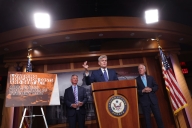You have /5 articles left.
Sign up for a free account or log in.
With just a week before the federal Perkins Loan program is set to expire, a bipartisan effort to extend the program emerged in the U.S. House on Thursday. Representatives Mike Bishop, a Michigan Republican, and Mark Pocan, a Wisconsin Democrat, introduced a bill that would allow the Perkins Loan program to continue through next September.
Colleges and higher education groups have stepped up their lobbying in recent weeks to prevent the program from expiring next Thursday, Oct. 1. Some Republicans have been critical of the program as they look to simplify and streamline the array of federal student loan options.
Representative John Kline of Minnesota, the Republican who chairs the House education committee, said Thursday that he supports the one-year extension. “The current financial aid system is too confusing, complicated, and can discourage students from pursuing a college degree,” he said in a statement. “But this is just one of many challenges facing today’s higher education system. This bill will ensure we continue to support students and institutions while we continue our larger effort to strengthen higher education.”
Beyond debates about whether the Perkins program should continue, lawmakers also need to come up with more than $500 million elsewhere in the budget to offset what the Congressional Budget Office has determined is a cost of renewing the program.
The deal reached by Democrats and Republicans on the House education committee Thursday would pay for the program’s renewal by scaling back the program’s grandfathering provisions, reducing the amount of time that borrowers are eligible to receive additional Perkins Loans.
Under the bill, students who receive a Perkins Loan for the current 2015-16 school year (or those who previously received one) will be eligible to receive additional Perkins Loans until March 31, 2018, instead of Sept. 30, 2020, which is the current law.
Separately, the Perkins Loan extension bill would also renew for one year the authorizations of two higher education committees: the National Advisory Committee on Institutional Quality and Integrity, which advises the Education Department on accreditation issues, and the Advisory Committee on Student Financial Assistance, which makes recommendations to policy makers on financial aid issues.




